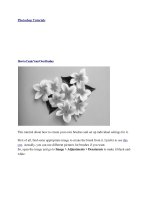Templates
Bạn đang xem bản rút gọn của tài liệu. Xem và tải ngay bản đầy đủ của tài liệu tại đây (1.36 MB, 46 trang )
Copyright © 2007 Pearson Education, Inc. Publishing as Pearson Addison-Wesley
Chapter 17
Templates
Slide 17- 3
Copyright © 2007 Pearson Education, Inc. Publishing as Pearson Addison-Wesley
Overview
17.1 Templates for Algorithm Abstraction
17.2 Templates for Data Abstraction
Copyright © 2007 Pearson Education, Inc. Publishing as Pearson Addison-Wesley
17.1
Templates for Algorithm
Abstraction
Slide 17- 5
Copyright © 2007 Pearson Education, Inc. Publishing as Pearson Addison-Wesley
Templates for Algorithm Abstraction
Function definitions often use application
specific adaptations of more general algorithms
For example: The general algorithm used in
swap_values could swap variables of any type:
void swap_values(type_of_var& v1,
type_of_var& v2)
{
type_of_var temp;
temp = v1;
v1 = v2;
v2 = temp;
}
Slide 17- 6
Copyright © 2007 Pearson Education, Inc. Publishing as Pearson Addison-Wesley
swap_values for char
Here is a version of swap_values to swap
character variables:
void swap_values(char& v1, char& v2)
{
char temp;
temp = v1;
v1 = v2;
v2 = temp;
}
Slide 17- 7
Copyright © 2007 Pearson Education, Inc. Publishing as Pearson Addison-Wesley
A General swap_values
A generalized version of swap_values is shown
here.
void swap_values(type_of_var& v1, type_of_var& v2)
{
type_of_var temp;
temp = v1;
v1 = v2;
v2 = temp;
}
This function, if type_of_var could accept any type,
could be used to swap values of any type
Slide 17- 8
Copyright © 2007 Pearson Education, Inc. Publishing as Pearson Addison-Wesley
A C++ function template will allow swap_values
to swap values of two variables of the same type
Example:
template<class T>
void swap_values(T& v1, T& v2)
{
T temp;
temp = v1;
v1 = v2;
v = temp;
}
Template prefix
Type parameter
Templates for Functions
Slide 17- 9
Copyright © 2007 Pearson Education, Inc. Publishing as Pearson Addison-Wesley
Template Details
template<class T> is the template prefix
Tells compiler that the declaration or definition
that follows is a template
Tells compiler that T is a type parameter
class means type in this context
(typename could replace class but class is usually
used)
T can be replaced by any type argument
(whether the type is a class or not)
A template overloads the function name by
replacing T with the type used in a function call
Slide 17- 10
Copyright © 2007 Pearson Education, Inc. Publishing as Pearson Addison-Wesley
Calling a Template Function
Calling a function defined with a template is
identical to calling a normal function
Example:
To call the template version of swap_values
char s1, s2;
int i1, i2;
…
swap_values(s1, s2);
swap_values(i1, i2);
The compiler checks the argument types and
generates an appropriate version of swap_values
Slide 17- 11
Copyright © 2007 Pearson Education, Inc. Publishing as Pearson Addison-Wesley
Templates and Declarations
A function template may also have a separate
declaration
The template prefix and type parameter are used
Depending on your compiler
You may, or may not, be able to separate
declaration and definitions of template functions just
as you do with regular functions
To be safe, place template function definitions in the
same file where they are used…with no declaration
A file included with #include is, in most cases,
equivalent to being "in the same file"
Slide 17- 12
Copyright © 2007 Pearson Education, Inc. Publishing as Pearson Addison-Wesley
T is the traditional name for the type parameter
Any valid, non-keyword, identifier can be used
"VariableType" could be used
template <class VariableType>
void swap_values(VariableType& v1,
VariableType& v2)
{
VariableType temp;
…
}
Display 17.1
The Type Parameter T
Slide 17- 13
Copyright © 2007 Pearson Education, Inc. Publishing as Pearson Addison-Wesley
Templates with
Multiple Parameters
Function templates may use more than one
parameter
Example:
template<class T1, class T2>
All parameters must be used in the template function
Slide 17- 14
Copyright © 2007 Pearson Education, Inc. Publishing as Pearson Addison-Wesley
Algorithm Abstraction
Using a template function we can express more
general algorithms in C++
Algorithm abstraction means expressing
algorithms in a very general way so we can
ignore incidental detail
This allows us to concentrate on the
substantive part of the algorithm
Slide 17- 15
Copyright © 2007 Pearson Education, Inc. Publishing as Pearson Addison-Wesley
Program Example:
A Generic Sorting Function
The sort function below uses an algorithm that
does not depend on the base type of the array
void sort(int a[], int number_used)
{
int index_of_next_smallest;
for (int index = 0; index < number_used -1; index++)
{
index_of_next_smallest =
index_of_smallest(a, index, number_used);
swap_values(a[index], a[index_of_next_smallest]);
}
}
The same algorithm could be used to sort an array of
any type
Slide 17- 16
Copyright © 2007 Pearson Education, Inc. Publishing as Pearson Addison-Wesley
sort uses two helper functions
index_of_smallest also uses a general
algorithm and
could be defined with a template
swap_values has already been adapted as a
template
All three functions, defined with templates, are
demonstrated in
Display 17.2
Display 17.3 (1-2)
Generic Sorting:
Helping Functions
Slide 17- 17
Copyright © 2007 Pearson Education, Inc. Publishing as Pearson Addison-Wesley
Templates and Operators
The function index_of_smallest compares items
in an array using the < operator
If a template function uses an operator, such
as <, that operator must be defined for the
types being compared
If a class type has the < operator overloaded
for the class, then an array of objects of the
class could be sorted with function template
sort
Slide 17- 18
Copyright © 2007 Pearson Education, Inc. Publishing as Pearson Addison-Wesley
Defining Templates
When defining a template it is a good idea…
To start with an ordinary function that
accomplishes the task with one type
It is often easier to deal with a concrete case rather
than the general case
Then debug the ordinary function
Next convert the function to a template by
replacing type names with a type parameter









